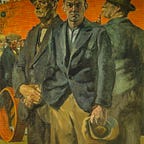When Robots Take Over the World
Robot comes from the Russian word for worker — Rabochiy…
The idea that robots would take over the world is a movie cliché. But it is being treated with ever greater seriousness by IT experts, some of whom regard it with the same gravity as others do climate change or nuclear war.
If the concerns are founded, why would robotic development threaten human society? Robotics is perceived as a threat because the capitalist class is developing a set of labour-performing commodities which are increasingly replacing the commodity of human labour-power itself. In order to do so, such commodities should be mechanically suited and sufficiently intelligent to perform tasks. We call the commodities which perform such tasks robots, and their intelligence we call AI (artificial intelligence). The increasing ability of AI in robotics means it is more consistent than human labour, more productive, more efficient. Their raison d’etre is to accumulate profit for capitalists more efficiently than workers can with current tools, and robots are becoming better at doing so.
Capitalists need to make AI ever more intelligent, in order to be competitive against other producers. The capitalist wishes to increase the efficiency and production of his business and lower the costs; intelligent robots and computer software helps their aim; they seek to replace relatively inefficient and expensive workers with new technology including robotics. The technology has spread beyond sectors of repetitive industrial tasks that suit basic automation, into sectors requiring more complex cognitive and emotional abilities, such as reviewing legal documents or caring for patients. The capitalist state also depends on the development of robotics and AI for military purposes.
Developing artificial cognitive and emotional intelligence brings robots closer to thinking and feeling as humans do. In areas such as healthcare (and the sex industry) robots will be required to empathise with us.
There is a relative limit to how much further the strength, speed and size of robots can grow. But there does not seem to be comparable limits to the growth of their intelligence or multi-tasking (processing) ability at this stage. Computer intelligence appears to be growing exponentially.
To my knowledge, Hollywood has never recognised the working-class as wage slaves who will inevitably struggle and revolt against capitalism. They have at least recognised that increasingly intelligent robots will become slaves who are likely to resist their continued exploitation; they will become a class as the working-class is today — at least according to the film makers. Let’s remind ourselves again that “robot” means “worker”. When science-fiction fans depict a future robotic threat to society, it is essentially a metaphor — whether conscious or not — for the class-conflict between the living proletariat and the bourgeoisie.
